“Ares abandonará la escuela ordinaria a final de curso, si conseguimos plaza en el Centro de Educación Especial que queremos. Creemos en la inclusión, pero la inclusión no cree en nosotros. Tenemos leyes garantistas con presupuestos excluyentes que convierten automáticamente a las leyes en excluyentes. Nos marchamos de la educación ordinaria convencidos, aunque tristes. Tristes porque el sistema, para los niños con las dificultades que tiene Ares, te incluye con una mano, mientras te muestra con la otra la puerta de salida. Ares desparecerá de su entorno. El que le pertenece. Dejará de aprender algunas cosas y de enseñar muchas más a los que la rodean. El sistema conseguirá que todo sea más uniforme. Y que seamos invisibles”
Testimonios como el de los padres de Ares evidencian uno de los mayores déficits de la educación en España, la falta de una educación inclusiva que tenga en cuenta la diversidad de nuestra sociedad, y que excluye a miles de personas de las aulas.
A pesar de contar con los recursos, la crisis y los recortes han sido los aliados perfectos de las instituciones para desmantelar el sistema de atención a la diversidad y ser de los escasos países de la OCDE que ha acrecentado la desigualdad educativa en la última década. En contra de la creencia popular, la educación inclusiva no solo abarca personas con necesidades educativas especiales como discapacidades o trastornos graves, sino a alumnos con integración tardía en el sistema educativo español y la consecuente dificultad con el idioma, vulnerabilidad a la exclusión social y alumnos con superdotación intelectual que necesitan de un apoyo específico.
Es en ese conjunto de diversidades donde el sistema se ha visto gravemente afectado y -junto a los recortes, el aumento de la pobreza y la exclusión social sufridos por la población- hace que España esté casi diez puntos por encima de la media de la UE en abandono escolar temprano; y que esta realidad afecte en más del doble a la población extranjera que a la autóctona.
Las estadísticas oficiales recogidas por el Ministerio de Educación suelen llevar a engaño. Mientras el número de alumnos con necesidades específicas matriculados no para de aumentar en la escuela pública ordinaria, lo que daría a entender que España mejora en inclusión cada año, esas cifras olvidan los recursos necesarios de apoyo que se han visto reducidos en un 55% con los recortes.
Con la LOMCE como cómplice necesaria, los recortes en atención a la diversidad abarcan los programas más compensadores para los alumnos con mayores dificultades (que prácticamente han desaparecido de los Presupuestos), el aumento de las ratios, la eliminación de programas de formación para el profesorado, así como el papel fundamental de los profesores de apoyo que se ha visto minado con la pérdida de 35.000 puestos de trabajo
.Los recortes impulsados por el exministro Wert se olvidan, por tanto, del 38% de alumnado matriculado en la etapa obligatoria en España con necesidades específicas de apoyo educativo (ACNEAE).
El olvido de las instituciones ha sido el desencadenante que ha llevado a padres como los de Ares, en su caso en Cataluña, a optar por los centros de educación especial públicos, pero exclusivos para alumnos con discapacidades o trastornos graves.
“Ares es una niña con autismo no verbal y se comunica con pictogramas, nosotros necesitábamos un logopeda y la Generalitat rechazó esa posibilidad. No te expulsan porque no pueden, el rechazo es más sutil. Te dicen, si tantos apoyos necesitas vete a la Escuela de Educación Especial que ahí sí los tienes. Las instituciones están privando no solo a Ares de su derecho a la educación, sino también al resto del aula de enriquecer su conocimiento y que cuando salgan a la calle puedan reconocer esa diversidad y comunicarse con ella sin que les genere rechazo”, relata el padre de Ares Miguel Ángel Román.
Iniciativa popular contra la segregación de la educación
Pese al alto porcentaje de estudiantes con estas características matriculado en centros ordinarios, un 80% como media nacional, los recortes y la falta de apoyos están produciendo una reversión en la inclusión educativa. En Madrid, el propio consejero de Educación Rafael Van Grieken incentiva a las familias a matricular a sus hijos en los centros especiales afirmando que “sería un error no considerar la educación especial como inclusiva”.
El favorecimiento de centros que segregan al alumnado ha desencadenado en un aumento del 25% de escolarización en estos centros de la Comunidad de Madrid, en detrimento de su inclusión en las aulas ordinarias. Por ese motivo, padres y organizaciones han decidido llevar a cabo una Iniciativa Legislativa Popular (ILP) en la Comunidad de Madrid para exigir una autentica educación inclusiva y el fin de la deriva segregadora del gobierno autonómico.
Debido a la falta de legislación desarrollada en España, el primer paso de los promotores ha sido la definición de una tasa de necesidad escolar de apoyoentendida como “el número de alumnos/as susceptibles de requerir recursos extra para superar barreras y garantizar así su derecho a la educación”. A partir de esa tasa, la ILP pide políticas en tres niveles: “En la planificación equitativa de la escolarización para no incentivar culturas dentro de los centros que favorezcan la exclusión y la selección del alumnado. Por otro lado, medidas centradas en el aumento de profesionales de apoyo y en una reducción de ratios en las aulas con presencia de alumnos con necesidades específicas. En un tercer plano estaría la formación del profesorado y la creación de culturas inclusivas dentro de los centros y las aulas”, explica José Miguel Martín miembro de la coordinadora ciudadana ‘ILP Escolarización Inclusiva’.
Un grupo de niños atiende en clase. EFE/Archivo
La legislación autonómica exige el apoyo de tres municipios de más de 50.000 habitantes para llevar a cabo una iniciativa legislativa popular. De momento, cuentan con el apoyo de 14 municipios que representan a más de un millón de madrileños. En septiembre esperan que la ILP llegue a la Asamblea de Madrid.
Al estar cedidas las competencias en materia educativa, existen grandes desequilibrios en la inclusión en centros ordinarios dependiendo de la comunidad autónoma. Mientras Navarra y Galicia superan en diez puntos la media y tienen al 90% de alumnado con necesidades educativas especiales en centros ordinarios, la Comunidad Valenciana destaca en la parte negativa con solo el 17% de inclusión -seguida por Cataluña, Extremadura, Aragón, Canarias y la Comunidad de Madrid.
Si atendemos al conjunto de necesidades específicas de apoyo educativo, Madrid se convierte en la comunidad menos inclusiva con un 3,6% del alumnado integrado. Los promotores de la ILP, tras años recopilando datos e información, han constatado que “el sistema educativo de la Comunidad de Madrid muestra procesos de segregación alarmantes y carencias graves de recursos para el alumnado con más necesidades de apoyo”.
Respaldados por la encuesta PISA de 2015 que señalaba a Madrid como la comunidad autónoma con mayor segregación socioeconómica, los coordinadores de la ILP han evidenciado dentro de su estudio la concentración de alumnos con este tipo de necesidades en torno a determinadas zonas de localidades del sur; cuyos porcentajes superan el 10% mientras que en otras zonas de los mismos municipios no alcanzan el 1%. Como subraya el sociólogo y profesor Fernando Andrés Rubia, las políticas seguidas en Madrid por el Partido Popular han favorecido la segregación en mayor grado que en el resto de comunidades: “La implantación del bilingüismo en la comunidad ha sido la excusa perfecta para la segregación, provocando una concentración del alumnado más vulnerable en centros no bilingües.
Como consecuencia se está produciendo en Madrid una tendencia a la guetización, con centros casi exclusivos de población gitana e inmigrante, que va en contra de la cohesión social”. Rafael Feito, catedrático de Sociología de la Universidad Complutense, va más allá y señala a Madrid como la punta de lanza de la LOMCE: “Madrid es el claro ejemplo de unos gobernantes que han impulsado la educación privada y concertada, la diferenciación de los centros y la libertad de elección que al final se convierte en que quien tiene más recursos elige el centro que quiere”.
La educación inclusiva como un derecho universal
La Convención sobre los derechos de las personas con discapacidad fue ratificada por nuestro país en 2008. Como firmante del acuerdo, España se compromete en su artículo 24 a “garantizar el derecho de las personas con discapacidad a la educación, que no queden excluidas del sistema general de educación por motivos de discapacidad, y que puedan acceder a una educación primaria y secundaria inclusiva, de calidad y gratuita, en igualdad de condiciones con las demás, en la comunidad en que vivan”.
Esa es la reivindicación fundamental de la coordinadora ‘ILP Inclusiva’, considerando que los recursos existían y, a pesar de los recortes, siguen estando: “Abogamos por una redistribución de los recursos que ya existen y se otorgan a los centros de atención especial. No es necesario que se eliminen, sino que se redistribuyan en los centros ordinarios dónde están la inmensa mayoría de los niños que requieren apoyo específico. Se les está privando de la socialización básica, de poder convivir con niños del mismo barrio y de desarrollo social y cognitivo que deberían de tener dentro de la socialización normal de un niño”.Diversos profesores han aunado fuerzas en las redes sociales en lo que ellos autodefinen como “una auténtica revolución inclusiva” para apoyar la iniciativa madrileña.
Para Coral Elizondo, psicóloga y profesora en la Universidad de Zaragoza, el verdadero déficit del sistema se debe a la ausencia de formación al profesorado en educación inclusiva: “Lo que nos falta a los docentes es información, venimos de un modelo de los años 80 donde hablábamos al alumnado de integración, que es cuando se escolarizan por primera vez alumnos con necesidades educativas especiales en centros ordinarios. Desde entonces hemos cambiado de términos, ahora hablamos de inclusión, de un modelo que ya no es clínico, sino que es un modelo social.
Sin embargo, eso jamás nos lo han contado y hoy por hoy nuestras actuaciones en las aulas son segregadoras, siguen siendo como aquel programa experimental de los años 80. Sí que tenemos a los niños dentro de los colegios, pero todas las intervenciones qué hacemos con ellos son fuera del aula”.
De la misma opinión es Gerardo Echeita, profesor de Psicología Evolutiva y de la Educación de la Universidad Autónoma de Madrid, para quien estar en un centro ordinario es solo un primer paso: “No solo es una cuestión de espacios, es una cuestión de la calidad de la respuesta y de la educación que reciben en esos espacios comunes.
Si tienes un niño con discapacidad en una escuela ordinaria, pero está en una esquina, fuera del aula y sus compañeros no lo reconocen; por mucho que sus números sumen en la estadística ni de lejos es una respuesta inclusiva”. Ignacio Calderón, profesor de Teoría de la Educación en la Universidad de Málaga y una de las voces más reconocidas en la inclusión educativa, cree que el gran reto de nuestro sistema educativo pasa por hacer una enmienda a la totalidad de un modelo homogéneo que no tiene en cuenta la heterogeneidad de nuestra sociedad.
“En pleno siglo XXI seguimos pensando que hay un único ritmo que seguir con una metodología idéntica para todos y quien no cabe dentro de ese molde es excluido. Lo que es inconcebible es que sigamos pensando que tiene que haber un solo ritmo, ese es el meollo de la cuestión. Existen muchísimos estudios que demuestran el valor de la heterogeneidad cuando tiene cabida en el aula, porque aprendemos fundamentalmente de las diferencias. Aunque hemos formado las escuelas en torno a la homogeneidad”.
Fuente: http://www.publico.es/sociedad/educacion-inclusiva-derecho-olvidado-lomce-recortes.html
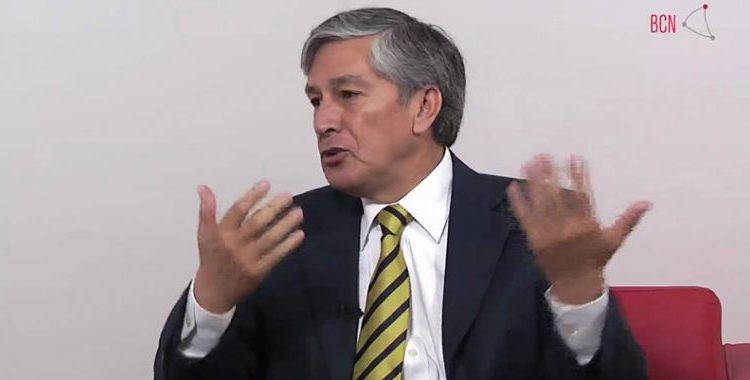
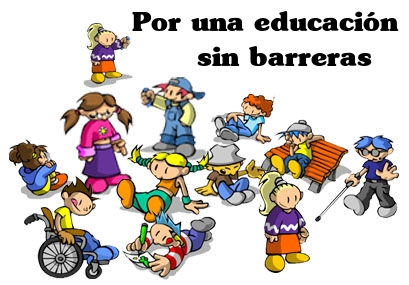
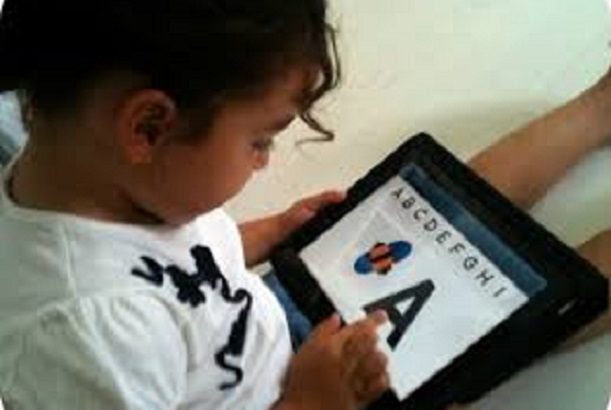

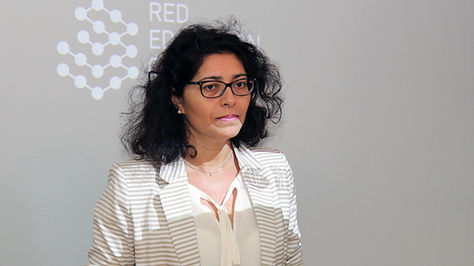
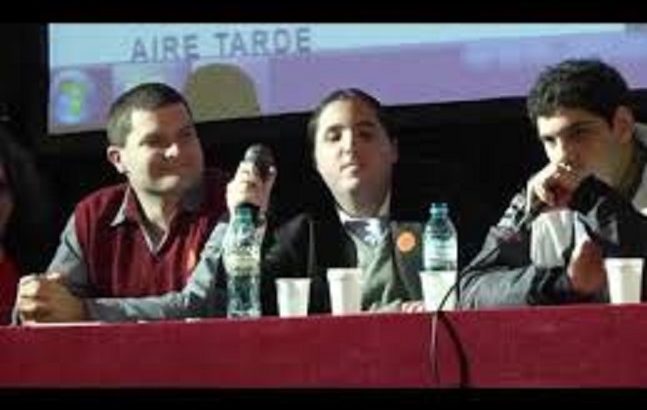
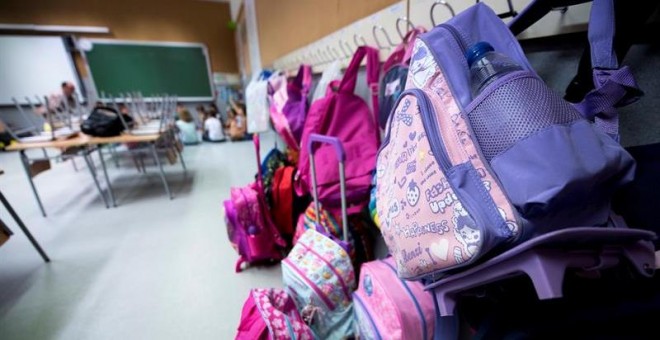
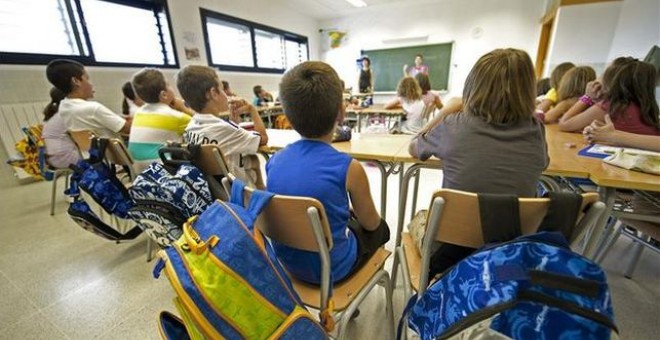





 Users Today : 50
Users Today : 50 Total Users : 35460353
Total Users : 35460353 Views Today : 71
Views Today : 71 Total views : 3419099
Total views : 3419099